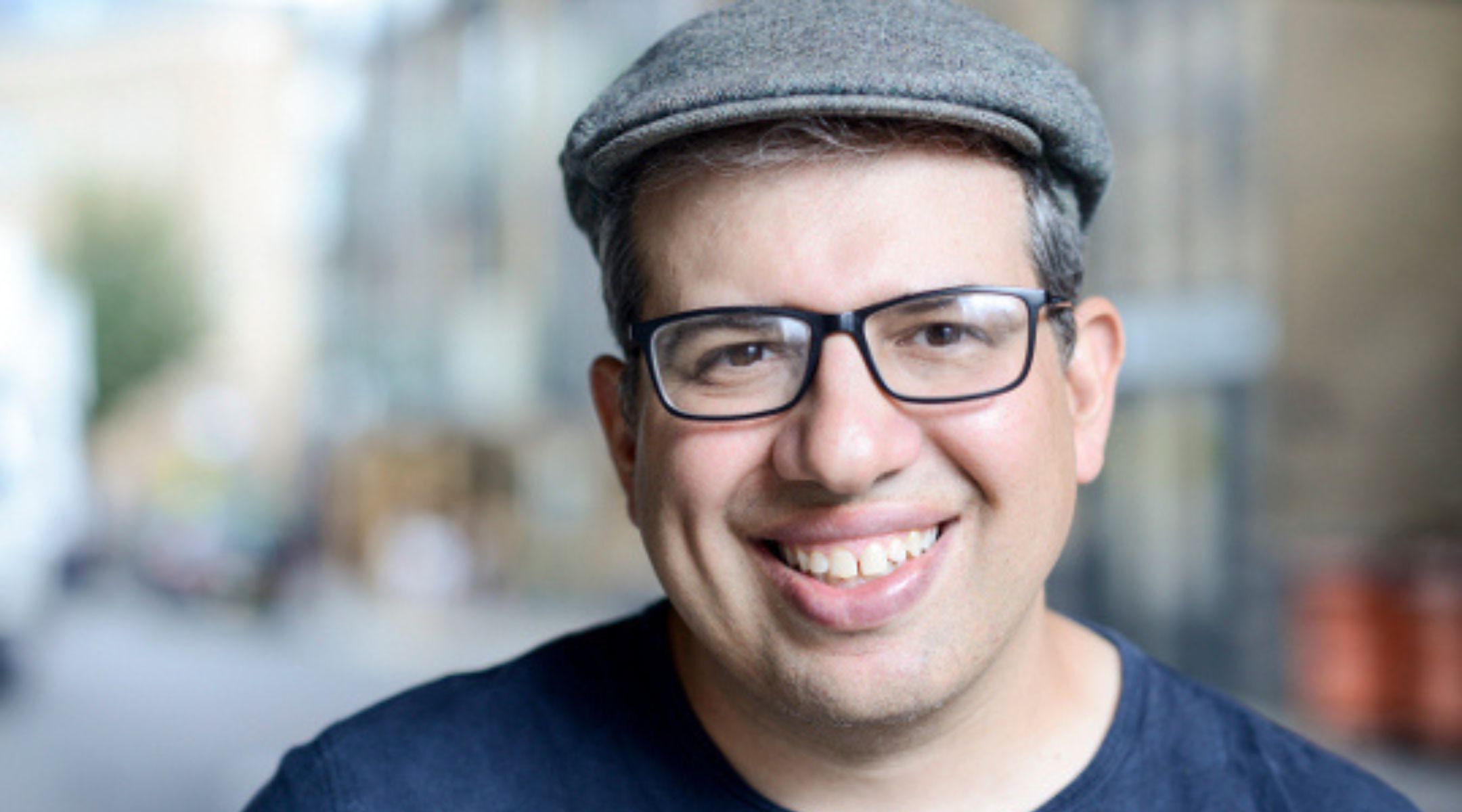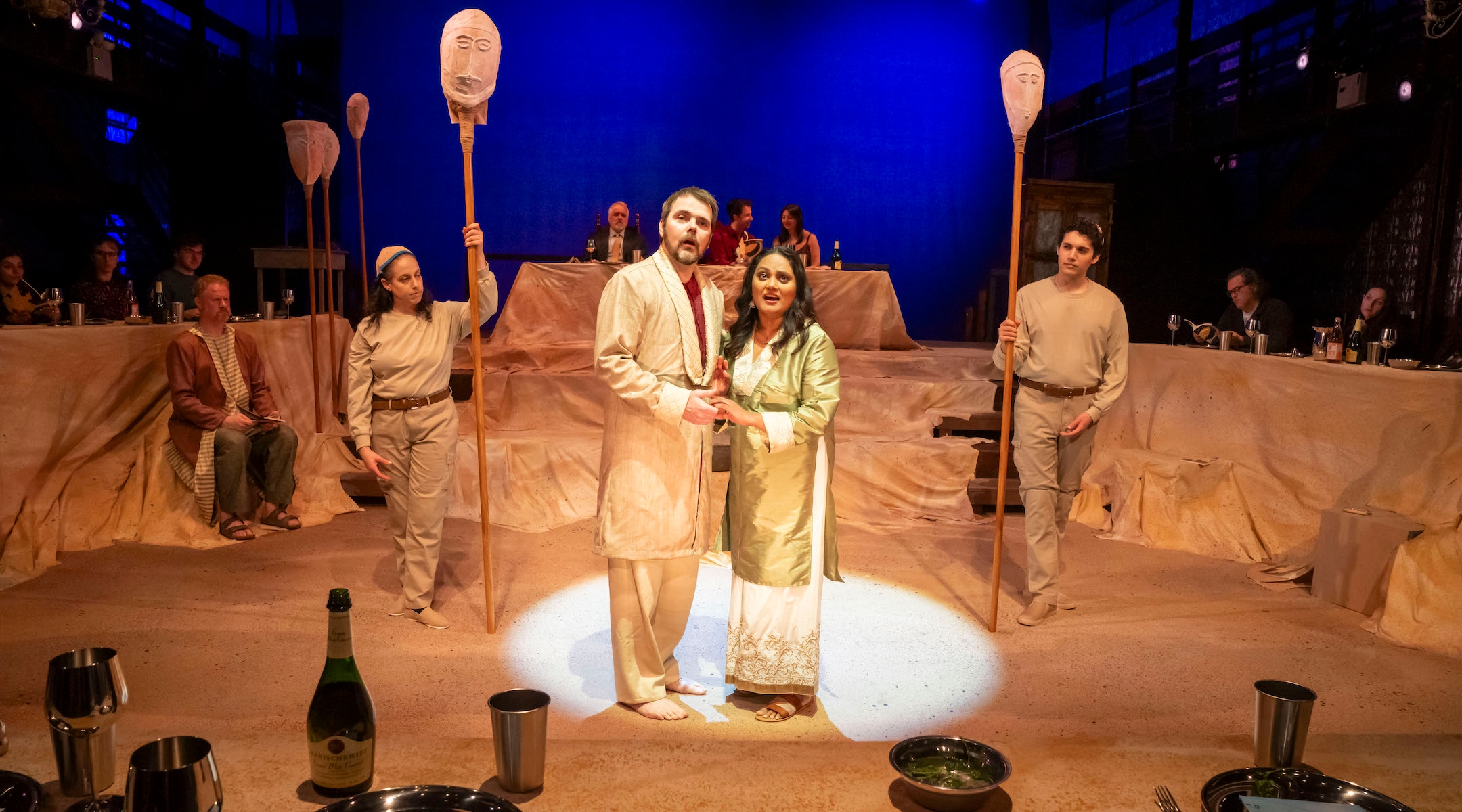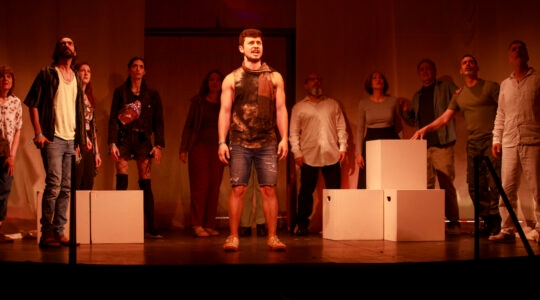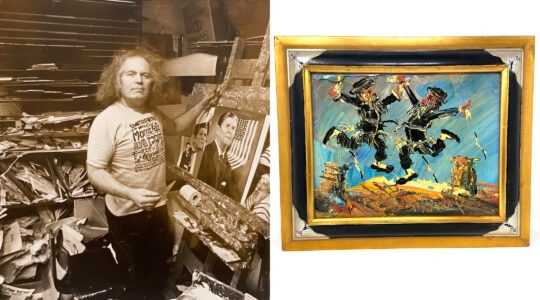(New York Jewish Week) — There’s charoset, Manischewitz wine and a rousing rendition of “Chad Gadya.” So what makes this East Village seder different from all other seders — besides taking place after the conclusion of the Passover holiday? For one thing, it takes place at an experimental theater. For another, the haggadah doubles as an opera libretto — and its participants are both audience members and actors.
This is the world premiere of Untitled Theater Company No. 61’s “Exagoge,” an opera within a play within a seder being staged this month at La MaMa Experimental Theater Club, a 63-year-old downtown institution.
Written and directed by Edward Einhorn, with original music by Avner Finberg, the production’s source material is the world’s oldest known Jewish play: an ancient Greek drama, also called “Exagoge,” that was written in Alexandria more than 2,000 years ago by someone known now as Ezekiel the Tragedian.
The writer Howard Jacobson has theorized that the original “Exagoge” — an interpretation of the Book of Exodus mixed with pagan ideas — was written in the second century BCE but was destroyed shortly after its creation by the Jewish elders, on grounds of idolatry. Today, only 269 lines remain.
In Einhorn’s version, the original lines of “Exagoge” are reimagined as an opera penned by Zeke, a young artist living in modern-day New York. The plot of the play unfolds as Zeke brings his new girlfriend, Aliya — a non-practicing Muslim — to his Jewish history professor father Avraham’s Upper West Side home for a Passover seder.
Einhorn, a longtime Upper West Side resident himself, weaves together the two stories — the play and the opera — using the 15-part structure of the seder. The production shifts back and forth between the play and the opera. The modern-day characters are seated on a platform upstage, from which Avraham is leading a seder. He treats the audience as his guests, engaging them in call-and-response readings from the haggadah. Those seated at tables closest to the stage are offered a small meal of matzah, charoset, eggs, gefilte fish and macaroons, served in tandem to the actors.
During the seder, as Avraham urges Zeke to talk about his new opera, the spotlight shifts downstage to three singers who act out the Exodus story as Moses, Tzipporah, Pharaoh and others. The themes in the operatic version of “Exagoge”— holding onto faith, marrying someone who comes from a different religious tradition — are paralleled in the scenes between Avraham, Aliya and Zeke. Throughout, a six-person chamber orchestra plays Finberg’s stirring score, and three puppeteers bring set elements, like the burning bush, a snake and a phoenix, to life.
The New York Jewish Week talked with Einhorn, 53, a few days after “Exagoge” opened to hear about how this multilayered production came together, its connection to Passover and what he considers the importance of ritual.
This interview has been lightly edited for length and clarity.
New York Jewish Week: What’s the genesis of your production of “Exagoge”? What led you to the original Ezekiel play, and what excited you about it?
Edward Einhorn: I came across the play in a book by Howard Jacobson called “The Exagoge of Ezekiel.” He had written a small translation, and the rest of the book gave the history and the dramaturgy. And I thought, well this is amazing. I didn’t know it existed, and I wanted to put it onstage. But of course, it was only in pieces. It was supposed to go up at La MaMa around 2012, but I hadn’t figured out what to do with it. Then I was part of the American Opera Project’s Composers & the Voice fellowship, where I was paired with the composer Avner Finberg, and it just occurred to me that maybe the answer is to make the original text of “Exagoge” an opera, and the way to finish the story is to put it inside a seder, because that tells the story of Exodus anyways. For the last eight years or so, Avner and I have been working on that together.

Librettist and playwright Edward Einhorn is the creator of “Exagoge,” and he is also the director. (Christian Smith)
This production is so linked to Passover, and it premiered during the holiday. Does it need to be performed during this time of year?
Support the New York Jewish Week
Our nonprofit newsroom depends on readers like you. Make a donation now to support independent Jewish journalism in New York.
It’s great to be able to do it during Pesach, but I don’t think it has to be. Originally, we were going to produce it upstate in 2020, but everything got canceled by COVID. But that would have been during the summer. I think it can be done anytime.
If you’re doing it outside of Passover, it might be harder to track down all those jars of gefilte fish. Speaking of which, why did you choose to add the immersive elements of the seder?
I said that to our food manager! I explained that we had to acquire all the matzah and macaroons that we could because they would disappear. I’ve had immersive elements in a number of shows. Here, I felt like if you’re going to have a Passover piece that’s going to involve a seder, you want people to experience the sensation of eating the food. It’s part of the ritual. And just watching people do it is not the same as having a chance to participate. So, I decided that would be part of the production as well.
You’ve been working on this play for a long time. Has the current environment surrounding Israel shifted the way that you’re thinking about the themes explored in “Exagoge”?
Yes, of course. I’m glad that when I first wrote it, I decided that I’m not going to minimize the difficulties in terms of cultural clashes, and having a character from a Muslim background. The feedback I’ve gotten from people is that it means something to them as a result. And it certainly means something to me that I’ve had a chance to put it up at this time. In some ways I’ve been trying not to obsess about the news, because I have a show to get up. But in some ways, it’s hard not to. Some of the people at La MaMa had said to me, maybe this could be a healing play. And my first reaction to that was a little cynical — like it’s a piece of theater, it’s not going to end hate or violence. I still feel that way. But it does mean a lot to me that people from all over the place in terms of their political leanings can respond to it.
Some audience members might have attended one or two seders already this year, while for others, this might be their first experience with a seder. Do you think that viewers need any familiarity with seders before seeing the show?
I’ve always wanted to invite a lot of people to my seder, but I don’t have the room; I can fit maybe eight people in my apartment. This has been the chance to share with people, who have never been to a seder or rarely been to a seder, what I love about seders. And for people who have been to multiple seders, I think there is something that hits home in a certain way. It’s another way to celebrate, and a different way to appreciate this story.
What about seders do you love that you were able to include in “Exagoge”?
The structure. I have this line early, pointing out that seder means order — it’s theater to me. It’s always been the idea that a well-structured play comes from the tradition of well-structured ritual. This love that I have for theater, and so many Jewish people have for theater, I think does connect to our tradition of ritual, and the very specific theatricalization of the way that we observe.
“Exagoge” runs through May 12 at La MaMa’s Ellen Stewart Theatre (66 East 4th St.). Tickets are $35.





